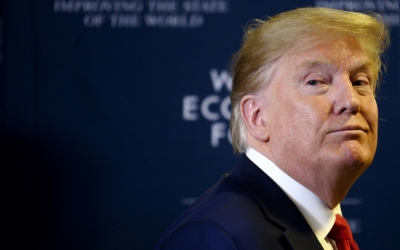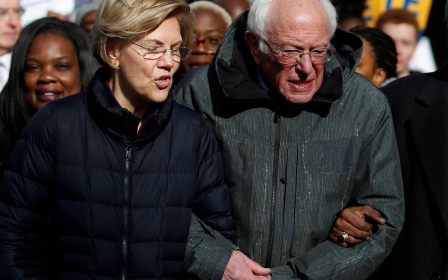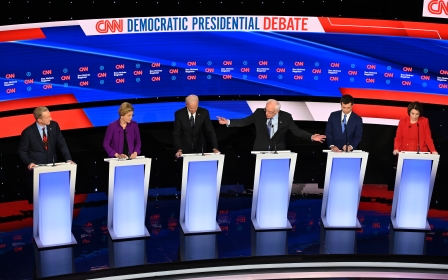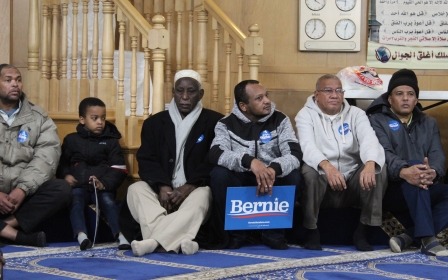Iran, Israel, IS: Trump celebrates Middle East 'victories' during State of Union speech
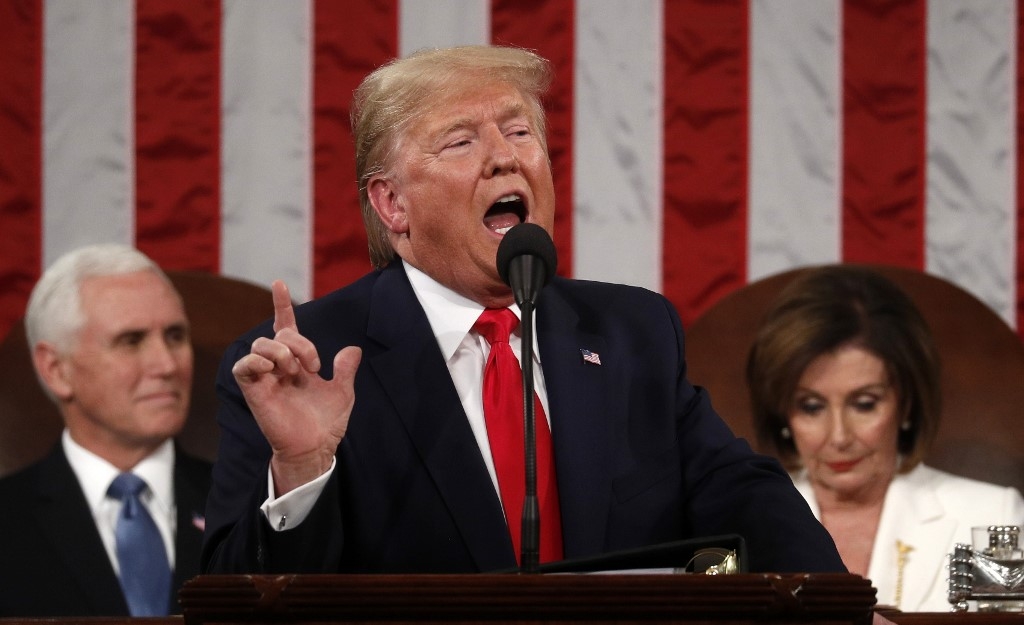
Over an hour into his State of the Union address, US President Donald Trump segued into a short section on foreign policy, lauding his Middle East peace plan, defeat of the Islamic State and recent deadly strike that killed Iran's top general.
The State of the Union is a yearly presidential address during which the US leader touts accomplishments and outlines a vision for the future of the country.
This year, Trump's address, his third since taking office, was widely viewed as the kick-off for his 2020 presidential campaign.
Still, while the Middle East was central in many of Trump's major policy moves during the past year, the economy, the US southern border and other domestic issues took centre stage.
Near the end of his speech, after applauding his administration's efforts in combating "radical Islamic terror" Trump moved on to his plan for Israel and Palestine, details of which were released last week.
New MEE newsletter: Jerusalem Dispatch
Sign up to get the latest insights and analysis on Israel-Palestine, alongside Turkey Unpacked and other MEE newsletters
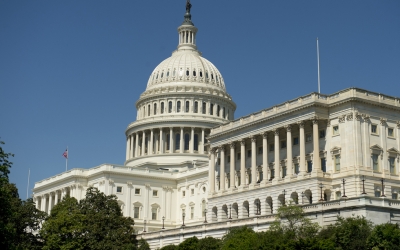
"Recognising that all past attempts have failed, we must be determined and creative in order to stabilise the region and give millions of young people the chance to realise a better future," Trump said.
While the economic portion of the plan was laid out over the summer, the Trump administration on 28 January released the political outline for the so-called "deal of the century".
The Palestinian leadership rejected Trump's efforts from the start, announcing they would boycott the plan, which was announced after the Trump administration made a series of pro-Israeli policy moves, including its recognition of Jerusalem as the undivided capital of Israel.
Trump said nothing further about the controversial Middle East plan, surprising Sarah Leah Whitson, former executive director of Human Rights Watch's Middle East division.
Whitson called the president's proposition "a groundbreaking plan for apartheid blessed by America" and criticised Trump for passing over the issue so quickly in his address.
"That was it? One sentence on the apartheid plan by which the US proposes permanent bantustans for millions of Palestinians under the boot of Israel in total defiance of international law? That’s really it?" Whitson tweeted during the speech.
Trump's foreign policy portion of his address mostly focused on honouring past victories, and steering clear of announcements for the administration's future.
He applauded the October killing of Islamic State group's leader Abu Bakr al-Baghdadi, introducing the parents of Kayla Mueller, a humanitarian worker from Arizona who was captured and killed by IS.
"In 2013, while caring for suffering civilians in Syria, Kayla was ... kept as a prisoner of al-Baghdadi himself. After more than 500 horrifying days of captivity, al-Baghdadi murdered young Kayla," Trump said, using another acronym for the IS group.
He also again stated that the IS group has been “100 percent destroyed”.
The US President's statement of victory over IS however directly contradicts a quarterly report from the Defense Department's inspector general released on Tuesday.
The report said that the Islamic State group remains "cohesive, with an intact command and control structure, urban clandestine networks, and an insurgent presence in much of rural Syria".
The report also said that Baghdadi's killing "did not result in any immediate degradation" of the IS group's capabilities.
Many of the policy points in Tuesday's State of the Union were initiated by the introduction of special guests, including recent US tensions with Iran.
Recognising the wife and teenage son of Christopher Hake, who was killed in 2008 by a roadside bomb in Baghdad, Trump said Iranian general Qassem Soleimani had supplied the explosive device used in the car bombing.
Trump called January's deadly attack on Soleimani a "flawless precision strike" that "terminated his evil reign of terror forever".
Omar Baddar, deputy director of the US-based Arab American Institute highlighted the questionable legal circumstances that have been central in aftermath of the US assassination.
"Just to be clear, the assassination of Qassem Soleimani was unlawful," Baddar tweeted. "It led to retaliatory strikes by Iran that caused brain trauma to dozens of U.S. soldiers; & it brought us to the brink of a quagmire war that could've literally killed millions of people."
During his speech, Trump also lauded Iranian protesters and called for Iran to "abandon its pursuit of nuclear weapons" and to "stop spreading terror".
The US in 2018 pulled out of the multilateral nuclear agreement with Iran established under the Obama administration, and instead launched an escalating "maximum pressure" campaign against Iran that has seen crippling sanctions imposed on the country.
“Because of our powerful sanctions, the Iranian economy is doing very poorly," Trump said on Tuesday.
"We can help them make it very good in a short period of time, but perhaps they are too proud or too foolish to ask for that help. We are here. Let’s see which road they choose. It is totally up to them,” he said.
"Our message to the terrorists is clear: you will never escape American justice. If you attack our citizens, you forfeit your life."
Middle East Eye delivers independent and unrivalled coverage and analysis of the Middle East, North Africa and beyond. To learn more about republishing this content and the associated fees, please fill out this form. More about MEE can be found here.


